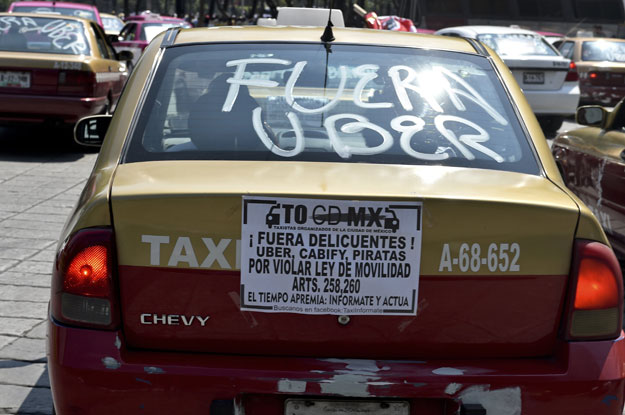Two months ago, hundreds of frustrated taxi drivers blocked traffic in Mexico City to call for government regulation of mobile-based car services like Uber. On Wednesday, those regulations arrived, as the city announced a slew of new rules to regulate the rapidly-growing industry.
But despite a list of regulations that includes new permit fees and a 1.5 percent tax on revenue (which will be shared with conventional taxi companies), it appears that Uber has come out ahead – for now.
Taxi collectives say the city failed to take into account their demands and that the terms of the new guidelines don’t match up with drafts they were shown beforehand. Ruben Alcántara, a taxi union leader, told Reuters that he would continue pushing for a cap on the number of Uber cars permitted to operate in the city; that a limit was not set forth is a major victory for the car service.
Nor is Mexico City the end of the line for the $40 billion company. Uber representatives said in a statement that the agreement was “forward thinking” and hoped that it would “encourage similar progress in cities around the world.” Mexico City is the first Latin American city and the largest worldwide to regulate the service. But elsewhere in the region, governments have been less inclined to come to terms with the reality of private car services.
In Colombia, Uber has faced considerable resistance from taxi unions, and some drivers have even reported violent confrontations with conventional taxi drivers. The platform’s legal status there is blurry: last November, Colombia’s transportation ministry banned the hiring of non-registered taxis using smartphone applications, but Uber continues to operate in the country’s largest cities.
In Brazil, the State Court of São Paulo temporarily suspended Uber’s operations last April on the grounds that it violates taxi regulations, but the company never complied. Brasilia and São Paulo’s city governments have both pushed through legislation to ban the app. Again, the company has not ceased operations there despite protests and the government’s seizing of over 20 vehicles since August 2014.
The ultimate effect that Mexico City’s new regulations have on the local taxi industry—and on Uber’s bottom line—could determine how municipal authorities throughout the region deal with the car service. If the outcry following Wednesday’s announcement is any indication, it could be a bumpy ride.




